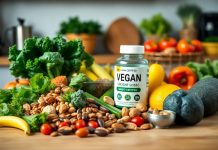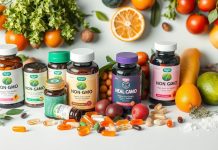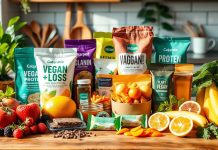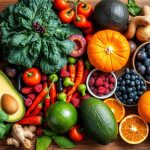Hey there, vegan folks! If you’re looking to boost your nutrient intake and maintain a healthy vegan lifestyle, then you’ve come to the right place. In this guide, we’ll break down everything you need to know about choosing supplements that align with your plant-based diet. We’ll explore the world of vegan-friendly supplements and uncover key considerations to help you make informed choices. So, let’s jump right in and discover the best way to support your vegan journey with the right supplements!

Table of Contents
Understanding veganism
Definition and principles of veganism
Veganism is a lifestyle that involves abstaining from the use of animal products, both in diet and other aspects of life. Being vegan means refraining from consuming foods such as meat, dairy, eggs, and honey, along with avoiding products made from animal-derived ingredients, like leather and fur. The core principles of veganism revolve around compassion for animals, environmental sustainability, and personal health.
Importance of a balanced vegan diet
A balanced vegan diet is crucial for meeting all your nutritional needs. It involves consuming a variety of plant-based foods that provide essential nutrients such as vitamins, minerals, protein, and fats. By carefully planning your meals and including a wide range of fruits, vegetables, whole grains, legumes, nuts, and seeds, you can ensure that your body receives all the necessary nutrients for optimal health. However, there are certain nutrients that may be more challenging to obtain solely from a plant-based diet, which is where supplements can play a valuable role.
Supplements and veganism
Reasons for supplementing on a vegan diet
While a well-planned vegan diet can provide most of the essential nutrients, there are a few nutrients that may require extra attention. These nutrients include vitamin B12, omega-3 fatty acids, vitamin D, calcium, iron, zinc, iodine, and protein. Supplementation can help ensure that vegans meet their recommended daily intake of these nutrients and prevent any deficiencies or potential health complications.
Importance of choosing vegan-friendly supplements
When choosing supplements, it is important to opt for vegan-friendly options to align with your dietary choices and values. Vegan-friendly supplements are those that are free from any animal-derived ingredients or testing. By selecting vegan supplements, you can ensure that your commitment to an animal-free lifestyle extends beyond your dietary choices.
Considerations for Optimal Supplementation
To maximize the effectiveness of supplements and ensure optimal nutrient absorption, it is important to take them as directed and in the appropriate dosages. It is also advised to consult with a healthcare professional or a registered dietitian to assess your specific nutrient needs and determine the most suitable supplement regimen for you.
Essential nutrients for vegans
Vitamin B12
Vitamin B12 is a crucial nutrient that is primarily found in animal-derived foods. It plays a crucial role in red blood cell production, nerve function, and DNA synthesis. Vegans are at a higher risk of vitamin B12 deficiency since plant-based sources do not provide sufficient amounts. Therefore, it is essential for vegans to supplement with vitamin B12 to maintain optimal health.
Omega-3 fatty acids
Omega-3 fatty acids, particularly EPA (eicosapentaenoic acid) and DHA (docosahexaenoic acid), are important for brain health, cardiovascular function, and reducing inflammation. While some plant-based sources, such as flaxseeds and chia seeds, provide a type of omega-3 called ALA (alpha-linolenic acid), the conversion of ALA to EPA and DHA in the body is limited. Vegans can choose algae-based omega-3 supplements, which are derived from marine algae and provide a direct source of EPA and DHA.
Vitamin D
Vitamin D is essential for bone health, immune function, and overall well-being. It is primarily obtained through sun exposure, but for individuals who live in areas with limited sunlight or spend minimal time outdoors, supplementation may be necessary. Vegans can select vitamin D supplements derived from plant sources, such as lichen, to meet their daily requirements.
Calcium
Calcium is crucial for bone health, muscle function, and nerve transmission. While dairy products are a common source of calcium, vegans can obtain this mineral from plant-based sources such as fortified non-dairy milk, tofu, leafy greens, and sesame seeds. In certain cases, calcium supplementation may be necessary to ensure adequate intake.
Iron
Iron is necessary for the production of red blood cells and maintaining energy levels. Plant-based sources of iron include legumes, fortified cereals, spinach, and dried fruits. However, the absorption of iron from plant sources is less efficient compared to iron from animal products. To ensure adequate iron levels, vegans may consider iron supplementation, especially for those who have increased iron needs or have difficulty meeting their requirements through food alone.
Zinc
Zinc is involved in immune function, wound healing, and DNA synthesis. Good plant-based sources of zinc include legumes, whole grains, nuts, and seeds. However, the bioavailability of zinc from plant sources can be lower compared to animal-based sources. Vegans may benefit from zinc supplementation if their dietary intake is inadequate or if they have specific requirements due to factors such as pregnancy or illness.
Iodine
Iodine is essential for thyroid function and plays a key role in regulating metabolism. It is primarily found in seafood and iodized salt. While some plants grown in iodine-rich soils can contain this mineral, the content can vary. Vegans should ensure their salt is iodized and consider iodine supplementation if their iodine intake is inadequate.
Protein
Protein is required for building and repairing tissues, maintaining muscle mass, and supporting various bodily functions. While it is possible to obtain adequate protein from plant sources such as legumes, tofu, tempeh, and quinoa, some vegans, particularly those with higher protein needs or specific dietary restrictions, may choose to supplement with plant-based protein powders to meet their daily requirements.
Reading supplement labels
Certified vegan labels
When selecting supplements, look for certified vegan labels from reputable organizations such as the Vegan Society or the Certified Vegan program. These labels provide assurance that the product does not contain any animal-derived ingredients and is not tested on animals.
Identifying non-vegan ingredients
Become familiar with common non-vegan ingredients that may be present in supplements, including gelatin, lactose, carmine, and certain derivatives of animal sources. Carefully read the ingredient lists and avoid products that contain any such ingredients.
Avoiding animal-derived additives
In addition to the main active ingredients, some supplements may contain animal-derived additives, such as stearic acid or magnesium stearate. Look for supplements that specifically state they are free from any animal-derived additives or binders.
Checking for gelatin capsules
Capsules made from gelatin, a protein obtained from animal bones and skin, are commonly used in supplement products. Ensure that the supplements you choose are either in vegan-friendly capsules or in alternative forms such as tablets or powders.
Verifying ingredients’ sources
Some ingredients, such as vitamin D3, can be derived from either plant or animal sources. Look for specific information on the source of each ingredient to ensure that it aligns with your vegan values.
Cross-contamination risks
Be aware of potential cross-contamination risks, particularly if the supplements are manufactured in facilities that also process animal-derived products. Look for supplements that are explicitly labeled to be free from cross-contamination or produced in dedicated vegan facilities to minimize the risk of exposure to non-vegan ingredients.

Vegan-friendly alternatives
Plant-based multivitamins
Plant-based multivitamins are an excellent way to ensure comprehensive nutrient support for vegans. These multivitamins are specifically formulated to provide a wide range of vitamins and minerals that may be lacking in a vegan diet. Look for multivitamins that are tailored to vegan needs, such as those containing adequate amounts of vitamin B12, iron, and other important nutrients.
Vitamin B12 supplements
Since vitamin B12 is primarily found in animal-derived foods, supplementation is necessary for vegans. Vitamin B12 supplements come in different forms, including tablets, sublingual sprays, and fortified plant-based milks. Choose a supplement that provides an adequate dosage and consider consulting a healthcare professional to determine the appropriate form and dosage based on your specific needs.
Algae-based omega-3 supplements
To meet the omega-3 fatty acid requirements, choose algae-based supplements. These supplements are derived from marine algae, the original source of omega-3s for fish. Algae-based omega-3 supplements provide a direct source of EPA and DHA, bypassing the need for fish-derived oils.
Plant-based vitamin D sources
While sunlight is the primary source of vitamin D for most individuals, vegan-friendly sources of vitamin D can also be found. Fortified plant-based milks, cereals, and certain varieties of mushrooms are good sources of plant-based vitamin D. Incorporating these foods into your diet can help meet your vitamin D needs without supplementation.
Calcium-rich plant foods
To ensure adequate calcium intake, include calcium-rich plant foods in your diet. These include fortified non-dairy milks, tofu made with calcium sulfate, calcium-set tempeh, leafy greens (such as bok choy and kale), and sesame seeds. By incorporating these foods into your meals, you can obtain sufficient calcium without the need for supplementation.
Non-heme iron sources
Boost your dietary intake of non-heme iron by including plant-based sources in your meals. Some good sources of non-heme iron include legumes, lentils, fortified cereals, spinach, tofu, and nuts. Consuming these foods along with vitamin C-rich foods, like citrus fruits or bell peppers, can enhance iron absorption.
Zinc-rich plant foods
Ensure sufficient zinc intake by incorporating zinc-rich plant foods into your diet. Good sources of zinc include legumes, whole grains, nuts, and seeds, particularly pumpkin seeds. By including these foods in your meals, you can maintain adequate zinc levels without the need for supplementation.
Iodized salt
To meet iodine requirements, choose iodized salt for your cooking and seasoning needs. Iodized salt contains added iodine, which is important for thyroid function and maintaining optimal metabolism. However, it is important to use iodized salt in moderation, as excessive salt intake can have negative health effects.
Plant-based protein sources
Include a variety of plant-based protein sources in your diet to meet your protein needs. Legumes (such as lentils, chickpeas, and black beans), tofu, tempeh, seitan, quinoa, and various nuts and seeds are excellent plant-based protein options. By incorporating these protein-rich foods into your meals, you can ensure sufficient protein intake without relying solely on supplements.
Special considerations for vegans
Pregnancy and breastfeeding
During pregnancy and breastfeeding, it is important to pay extra attention to nutrient intake to support both the mother’s and baby’s needs. Consult with a healthcare professional to determine if additional supplementation is required to meet the increased nutrient demands during this crucial period.
Children and adolescents
Children and adolescents have specific nutrient requirements for growth and development. It is important to ensure that they receive sufficient amounts of key nutrients such as vitamin B12, iron, calcium, and omega-3 fatty acids. Consult with a pediatrician or a registered dietitian for guidance on appropriate vegan-friendly supplements for children and adolescents.
Older adults
As individuals age, their nutrient needs may change. Older adults may be at an increased risk of nutrient deficiencies, including vitamin B12 and vitamin D. Regular monitoring of nutrient levels and appropriate supplementation can help older adults maintain optimal health.
Athletes and active individuals
Athletes and highly active individuals have increased nutrient requirements due to the demands placed on their bodies. Ensuring adequate intake of essential nutrients such as protein, iron, and zinc is crucial for performance and recovery. Consult with a sports dietitian to determine specific supplement needs based on your activity level and goals.
Health conditions and medications
Certain health conditions or medications may interfere with nutrient absorption or increase nutrient requirements. It is important to work closely with a healthcare professional to assess your individual needs and determine if specific supplements are necessary to support your health condition or medication regimen.

Consulting healthcare professionals
Importance of professional advice
Consulting with a healthcare professional, such as a registered dietitian or a physician specializing in plant-based nutrition, is essential when considering supplementation. These professionals can assess your specific nutrient needs, review your dietary patterns, and provide personalized recommendations to ensure optimal nutrition and overall health.
Finding a knowledgeable healthcare provider
Finding a healthcare provider who is knowledgeable about veganism and plant-based nutrition can be valuable in addressing your specific needs and concerns. Look for professionals who have experience working with vegans or who have received additional training in plant-based nutrition.
Nutritionists and dietitians
Registered dietitians or nutritionists who specialize in plant-based diets can provide valuable guidance and support. They can help create a well-balanced meal plan, suggest suitable supplements based on your lifestyle and goals, and offer ongoing assistance to help you achieve optimal nutrition as a vegan.
Dosage and timing
Recommended dosages for vegans
The recommended dosages for supplements can vary depending on individual needs, age, sex, and other factors. It is important to follow the recommended dosages provided on the supplement packaging or as advised by healthcare professionals. Taking excessive amounts of certain nutrients can be detrimental to your health, so it is essential to adhere to the recommended dosages.
Timing supplements with meals
Taking supplements with meals can enhance nutrient absorption and prevent digestive discomfort. Some supplements, like fat-soluble vitamins, are better absorbed in the presence of dietary fat. It is generally recommended to take supplements with a well-balanced meal or as instructed on the product label.
Potential interactions with medication
Certain supplements may interact with medications, either reducing their effectiveness or causing adverse effects. It is important to inform your healthcare professional about all the medications and supplements you are taking to ensure there are no potential interactions. They can guide you on the appropriate timing and dosage to avoid any unwanted effects.
Avoiding excessive supplementation
While supplements are intended to fill nutrient gaps, it is important not to rely solely on them for meeting your nutritional needs. A balanced and varied diet should always be the priority, with supplements serving as adjuncts to support optimal nutrition. Avoid excessive supplementation and prioritize obtaining nutrients through whole foods whenever possible.
Ensuring supplement quality and safety
Choosing reputable brands
To ensure supplement quality and safety, opt for reputable brands that have a good track record and positive customer reviews. Look for companies that prioritize transparency, conduct rigorous testing, and use high-quality ingredients.
Verification of third-party testing
Third-party testing provides an extra layer of assurance that the supplements meet the advertised quality standards. Look for supplements that have been independently tested by respected organizations, such as NSF International or ConsumerLab.com, to verify their quality and purity.
Avoiding unnecessary additives
Some supplements may contain unnecessary additives, fillers, or artificial ingredients. Read the ingredient list carefully and avoid supplements that contain unnecessary additives, especially if they do not align with your dietary preferences or may cause adverse reactions.
Considering organic and natural options
Organic and natural supplement options can be a preference for some individuals who value sustainable and environmentally friendly choices. Look for certified organic supplements that have been produced without the use of synthetic pesticides or chemicals.
Understanding expiration dates
Pay attention to the expiration dates on supplement packaging to ensure that you are consuming supplements within their optimal potency and safety. Expired supplements may not provide the desired benefits and can potentially pose health risks.
Storing supplements properly
Proper storage is essential to maintain the potency and effectiveness of supplements. Keep supplements in a cool, dry place, away from direct sunlight and moisture. Avoid storing them in areas prone to temperature fluctuations, such as the bathroom, as humidity and heat can degrade the quality of the supplements.
Conclusion
Achieving optimal nutrition as a vegan requires careful attention to your dietary choices and potential nutrient gaps. While a well-planned and balanced vegan diet can provide most of the essential nutrients, supplements may be necessary to ensure adequate intake of certain nutrients. By choosing vegan-friendly supplements, consulting with healthcare professionals, and following best practices for selecting, dosing, and storing supplements, you can support ethical and sustainable choices while maintaining optimal health as a vegan. Remember, a varied and balanced plant-based diet remains the foundation of a healthy vegan lifestyle, with supplements serving as valuable additions to support your dietary needs.












